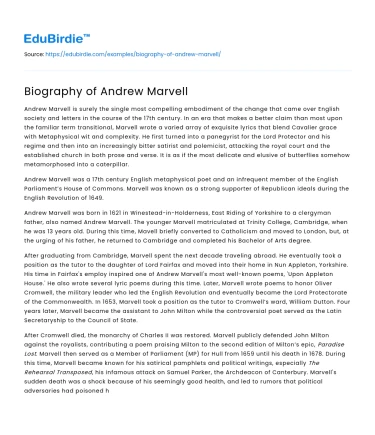Andrew Marvell is surely the single most compelling embodiment of the change that came over English society and letters in the course of the 17th century. In an era that makes a better claim than most upon the familiar term transitional, Marvell wrote a varied array of exquisite lyrics that blend Cavalier grace with Metaphysical wit and complexity. He first turned into a panegyrist for the Lord Protector and his regime and then into an increasingly bitter satirist and polemicist, attacking the royal court and the established church in both prose and verse. It is as if the most delicate and elusive of butterflies somehow metamorphosed into a caterpillar.
Andrew Marvell was a 17th century English metaphysical poet and an infrequent member of the English Parliament’s House of Commons. Marvell was known as a strong supporter of Republican ideals during the English Revolution of 1649.
Save your time!
We can take care of your essay
- Proper editing and formatting
- Free revision, title page, and bibliography
- Flexible prices and money-back guarantee
Andrew Marvell was born in 1621 in Winestead-in-Holderness, East Riding of Yorkshire to a clergyman father, also named Andrew Marvell. The younger Marvell matriculated at Trinity College, Cambridge, when he was 13 years old. During this time, Mavell briefly converted to Catholicism and moved to London, but, at the urging of his father, he returned to Cambridge and completed his Bachelor of Arts degree.
After graduating from Cambridge, Marvell spent the next decade traveling abroad. He eventually took a position as the tutor to the daughter of Lord Fairfax and moved into their home in Nun Appleton, Yorkshire. His time in Fairfax's employ inspired one of Andrew Marvell's most well-known poems, 'Upon Appleton House.' He also wrote several lyric poems during this time. Later, Marvell wrote poems to honor Oliver Cromwell, the military leader who led the English Revolution and eventually became the Lord Protectorate of the Commonwealth. In 1653, Marvell took a position as the tutor to Cromwell’s ward, William Dutton. Four years later, Marvell became the assistant to John Milton while the controversial poet served as the Latin Secretaryship to the Council of State.
After Cromwell died, the monarchy of Charles II was restored. Marvell publicly defended John Milton against the royalists, contributing a poem praising Milton to the second edition of Milton’s epic, Paradise Lost. Marvell then served as a Member of Parliament (MP) for Hull from 1659 until his death in 1678. During this time, Marvell became known for his satirical pamphlets and political writings, especially The Rehearsal Transposed, his infamous attack on Samuel Parker, the Archdeacon of Canterbury. Marvell's sudden death was a shock because of his seemingly good health, and led to rumors that political adversaries had poisoned him. However, these notions were later proven false.






 Stuck on your essay?
Stuck on your essay?

